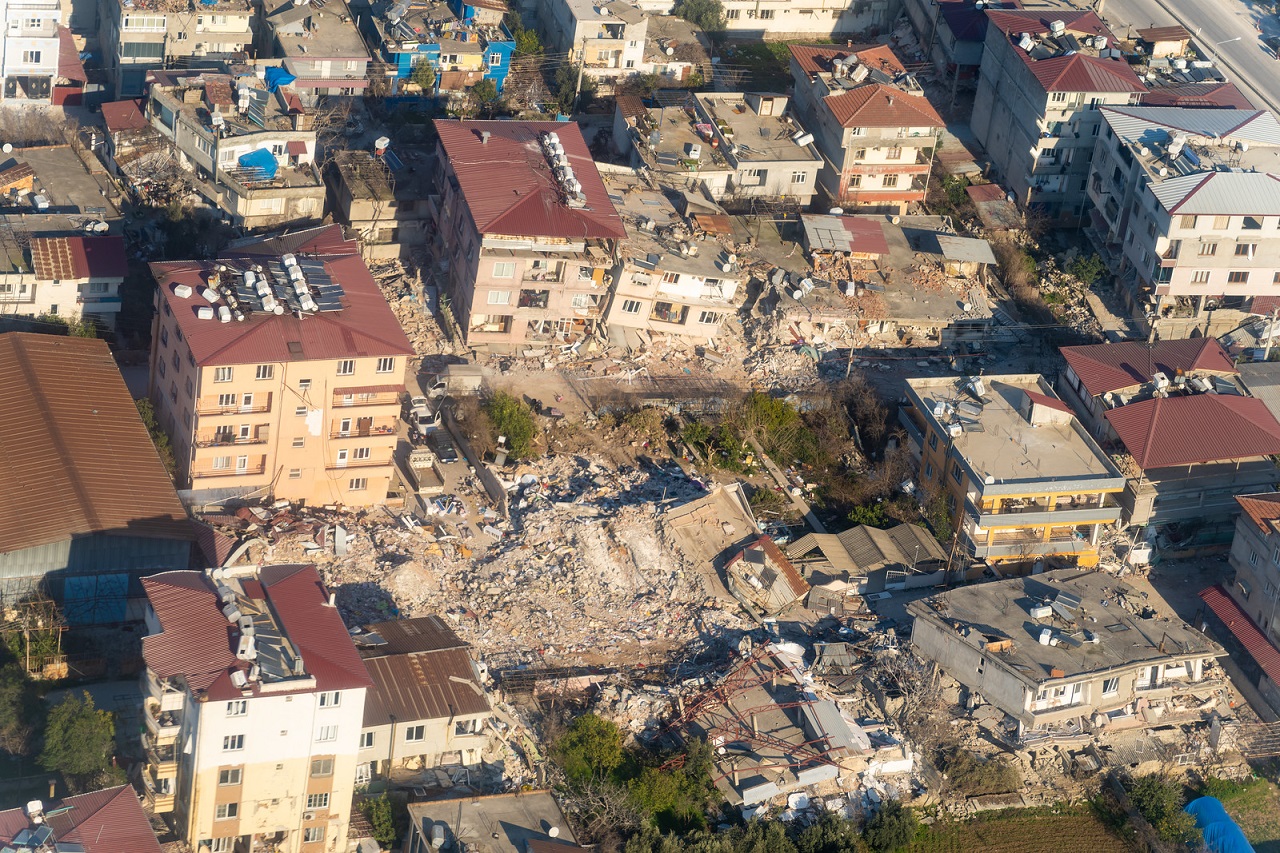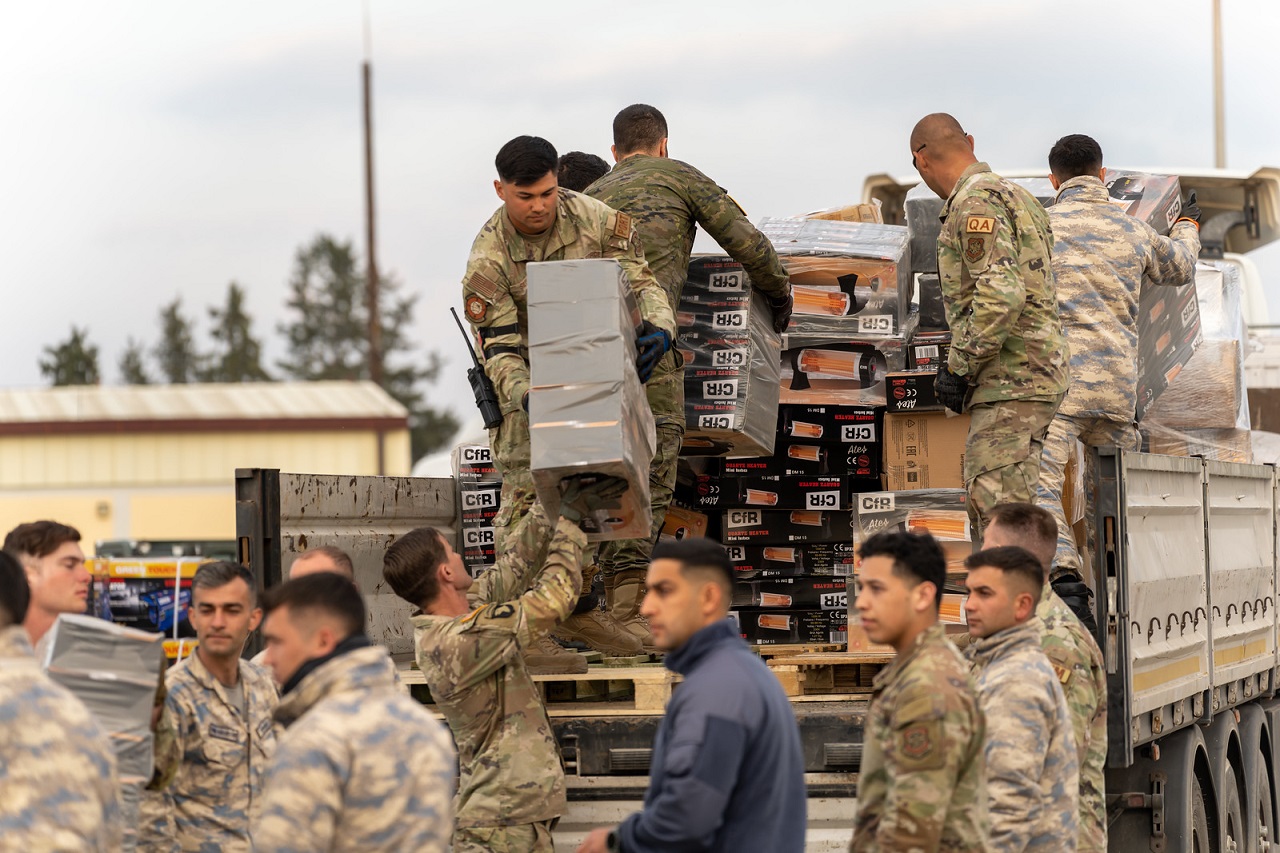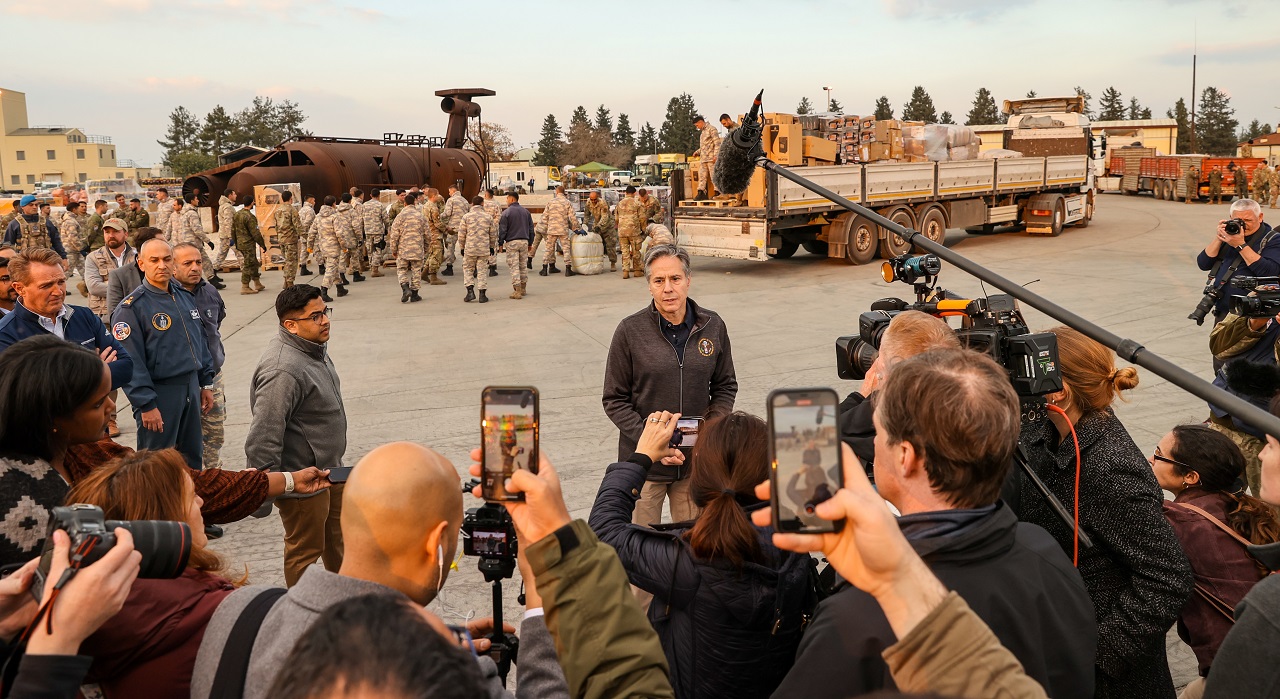
|
Antony J. Blinken
delivered 19 February 2023, Adana, Türkiye
[AUTHENTICITY CERTIFIED: Text version below transcribed directly from audio] SecState Blinken: [Hello, everyone. Hope I’m not too hard to hear -- lost my voice a little bit. But]1 first and foremost, we are here to stand with the people of Türkiye and -- and Syria in the wake of this devastating earthquake.
I just had a chance to fly over Hatay to see some of the devastation, and it’s really hard to put -- put into words.
You see buildings still standing and then buildings collapsed -- roofs destroyed, and right next -- right next to it something that’s still -- still standing. But it gives you some sense of the scale of this. We’ve had tens of thousands of deaths, tens of millions of people affected by this earthquake. And, of course, we still don’t know the full extent of it. Immediately, when the -- after the earthquake hit, the United States, other countries jumped in. We had search and rescue teams here within a day -- about 200 people, canines, other experts in trying to do search and rescue. We’ve had about 85 million dollars worth of assistance poured in immediately for housing and water and food and medicine and clothing -- all that in the immediate days following the earthquake. Today, I can announce that we will be bringing another 100 million dollars to assist those who are so desperately in need. We’ve drawn that from the Emergency Refugee and Migration Fund, as well as from a humanitarian assistance fund that State Department and the USAID [United States Agency for Internal Development] have. And that will be moving soon. At the same time, we are working in very close collaboration with our Turkish colleagues, both to understand all of the needs and to find ways to -- to deliver on them.
Our colleagues have flown something like 150 sorties. They’ve gotten helicopters out over hard-to-reach areas -- 24 million pounds of assistance is coming through this place.
And as you can see, it’s moving right on to the trucks behind me and it will move in to people who -- who need it; but also, USAID as always, responding so quickly and so effectively; the State Department, our mission here in Türkiye -- all of them coming together in collaboration with our Turkish partners to try to help people. This is going to be a long-term effort. The search and rescue, unfortunately, is coming to an end. The recovery operation is on, and then there’ll be a massive rebuilding effort. When you see the extent of the damage that’s -- the -- the number of buildings, the number of apartments, the number of homes that have been destroyed, it’s going to take a massive effort to rebuild. But we’re committed to supporting Türkiye in that effort. Many countries around the world are doing the same. There’s tremendous solidarity and a tremendous determination to see -- to see this through. The most important thing right now is to get assistance to people who need it, to get them through the winter, and to get them back on their feet. But simply put, the United States is here. We stand strongly with the people of Türkiye and the people of Syria through our NGO [non-governmental organization] implementing partners, and we’ll stick with it until we all get the job done.
Mr. Patel: Leon, go ahead.
Question: Yeah, Mr. Secretary, you mentioned the long-term recovery, of course, because the search and rescue is coming to an end, sadly. The Secretary-General of the UN requested one billion dollars in funding for long-term assistance also. What will the United States do more -- what more can you do on that front? And secondly, if I may, since you arrived today in Türkiye and tomorrow you have meetings with Turkish authorities, what are your expectations for those meetings and your meeting with the President Erdogan? SecState Blinken: Thanks, Leon. Look, the UN has put out a very important and urgent appeal, as you said, for a billion dollars. As of now the United States has contributed 185 million dollars in assistance, but we will look to see what, if anything more, we can do. Other countries are stepping up and stepping in, but it is very urgent that this appeal get funded, and we’ll certainly encourage others to do that even as we look at what additional resources we may be able to provide. But as I said, just today we’re announcing an additional hundred million dollars in this effort. More broadly -- and I’ll have an opportunity to speak to this tomorrow and the day after -- I expect that the conversations here will focus a lot on the work that we’re doing together to recover from the earthquake. And I look forward to learning as much as I can from our Turkish partners about what the needs are going forward, how we can best help, how we can best rally resources in support of people here. Mr. Patel: Michel. Question: Thank you, Mr. Secretary. First, [inaudible]. Second, there are attacks on U.S. military bases today and the last [couple of] days. Third, news reports say that Hamza al-Homsi [inaudible]. SecState Blinken: I don't have anything on the last part of your question about the -- about the -- the [Quds?] Force leader. With regard to aid getting to Syria -- Look, it's very, very challenging. The United States, of course, has provided more humanitarian assistance to Syria since the start of the war than any country -- about 15 billion dollars. But we do it through NGOs, through our economic partners on the ground. And the challenge -- excuse me for that [clearing of throat] -- and for everyone providing aid is getting it in. The United Nations has been restricted until just recently to one crossing point as a result, unfortunately, of efforts to block more crossing points by Russia and other countries. The Syrian government has said it will allow the use by the United Nations of a couple of additional crossing points. We -- We'll have to see if that works out in -- in practice. Meanwhile, NGOs have ways of -- of getting in through other places, but it's -- it's a very challenging situation. Having said that, we're trying to maximize the assistance that we and others can provide. The destruction, the damage done in Syria is -- is very, very significant, and it too needs a massive assistance effort. We'll do everything we can, including making sure, for example, that there's absolutely no doubt that whatever sanctions exist on Syria do not affect the provision of humanitarian assistance. They never have but we'll make sure that any...doubts about that so that anyone who's able can make sure their helping out by getting the aid to the folks who need it in Syria. Mr. Patel: Thank you, Press. Thank you. 1 From the official Dept of State transcript and unverified as delivered Original (Partial) Text Source: State.gov Original Images #1 and #2 (Earthquake Damage/Logistics Area): State.gov Original Video and Image #3 of SecState Source: DVIDShub.net Text Note: Supplemental transcription work by Michael E. Eidenmuller
Video Note: The appearance of U.S. Department of Defense (DoD)
visual information does not imply or constitute DoD endorsement.
Page Updated: 3/3/23
U.S. Copyright Status:
|
|
|
© Copyright 2001-Present. |


